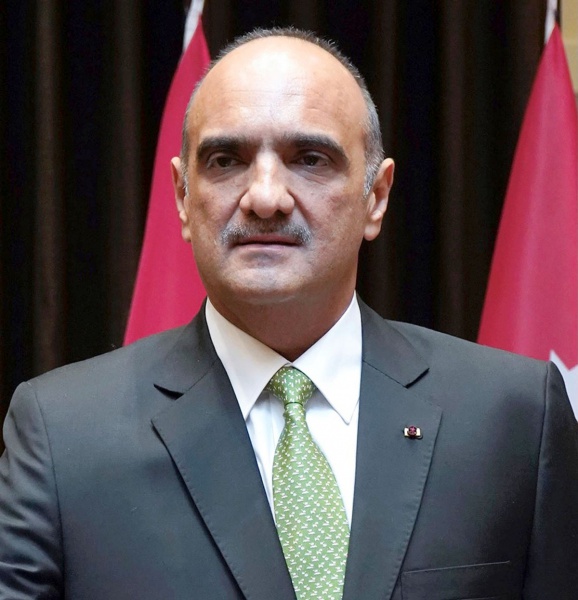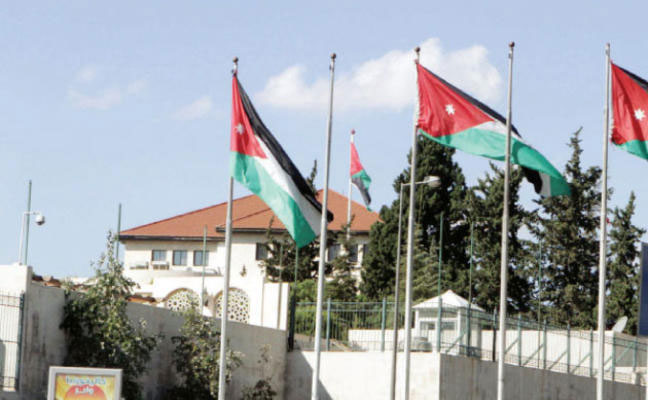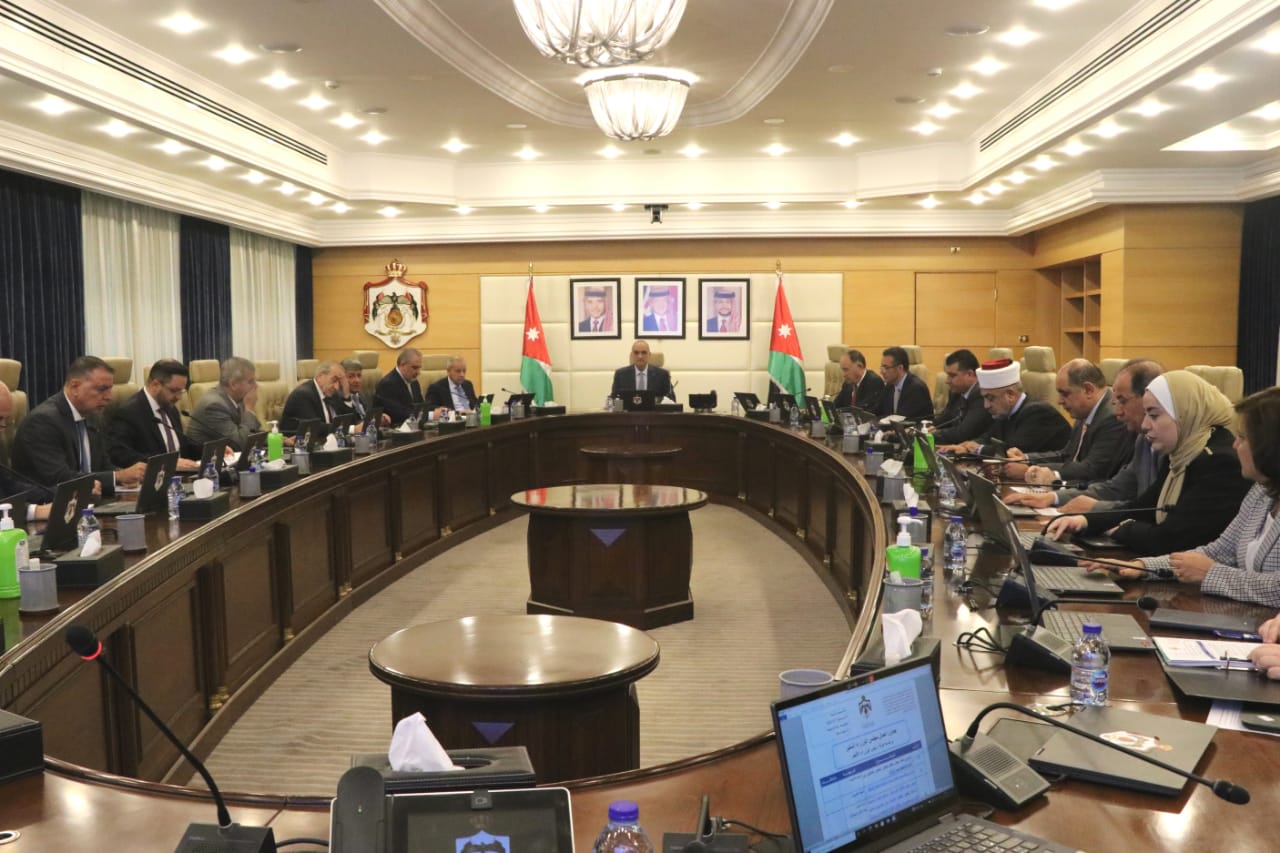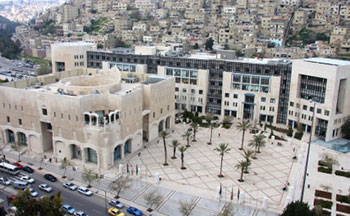 Web Content Viewer
Web Content Viewer
The Prime Ministry
Prime Minister

Prime Minister H.E. Dr. Bisher Al Khasawneh
Bisher Al-Khasawneh (Arabic: بشر الخصاونة; born 27 January 1969) is a Jordanian politician and diplomat who is serving as the 43rd Prime Minister of Jordan and Minister of Defence since 12 October 2020.
Prime Minister of Jordan
Incumbent
Assumed office
12 October 2020
Monarch Abdullah II
Preceded by Omar Razzaz
Minister of Defence
Incumbent
Assumed office
12 October 2020
Prime Minister Himself
Personal details
Born 27 January 1969 (age 53)
Nationality Jordanian
Spouse Rana Sultan
Children Hani and Nour.
Awards Order of the Star of Jordan, Order of Independence
Al-Khasawneh was an ambassador of Jordan to Egypt, France, Kenya, Ethiopia, African Union, League of Arab States, and to UNESCO. He also served as Coordinator General and Director of the Peace Process and Negotiations Bureau in Jordan. He served as Minister of State for Foreign Affairs between 2016 and 2017. He subsequently was Minister of State for Legal Affairs between 2017 and 2018. He served as the adviser to King Abdullah II for Communication and Coordination at The Royal Hashemite Court between April 2019 and August 2020. Until his appointment as Prime Ministerm Al-Khasawneh served as the adviser to the King for policies.
Life and career
Al-Khasawneh's father Hani was a leader of the Ba'ath Party. He studied at the School of Oriental and African Studies and then obtained a doctorate in law from the London School of Economics and Political Science. His doctoral thesis, dated 2007, was titled "An appraisal of the right of return and compensation of Jordanian nationals of Palestinian refugee origin and Jordan's right, under international law, to bring claims relating thereto, on their behalf to and against Israel and to seek compensation as a host state in light of the conclusion of the Jordan-Israel peace treaty of 1994". From June 2012 until September 2016, Khasawneh served as Jordanian ambassador to Egypt.
On 28 September 2016 he was named Minister of State for Foreign Affairs in Hani Mulki's cabinet. On 15 January 2017 he was named Minister of State for Legal Affairs in a cabinet reshuffle by Prime Minister Hani Mulki. Al-Khasawneh was sworn in as Jordan's Ambassador to France on 31 August 2018.
On 23 April 2019 he was named adviser for Communication and Coordination to King Abdullah II in The Royal Hashemite Court. On 18 August 2020 he was named as adviser to the king for policies.
Upon his appointment as Prime Minister on 8 October 2020 King Abdullah II instructed him to improve the capabilities of the state in the COVID-19 pandemic in Jordan. He was also tasked with overseeing the November 2020 parliamentary elections. His cabinet, in which he also serves as Minister of Defence, was sworn in on 12 October 2020. Al-Khasawneh stated he wanted to overhaul the Jordan economy, while focusing on developing a public safety net and planning a realistic government budget. Al-Khasawneh declared in a speech to the Jordan parliament in January 2021 that Jordan would receive 1 million doses of COVID-19 vaccine from BioNTech/Pfizer and 2 million doses from the COVAX initiative led by the Global Alliance for Vaccines and Immunization (GAVI), the World Health Organization (WHO), and the Coalition for Epidemic Preparedness Innovations (CEPI).
Education
• Bachelor degree in Law from University of Jordan.
• Executive Diploma in counter-radicalization and counter-terrorism from National Defense University.
• Executive Diploma in Public Policies from John F. Kennedy School of Government at Harvard University.
• Master degree in International Affaires, Diplomacy and Economics from SOAS, University of London.
• Master of Laws in International Law and Ph.D in Law from the London School of Economics and Political Science.
Positions
• President of the Legal Committee Council of Ministers of Jordan.
• Member of Economic Development and Services and Social Affairs Committees Council of Ministers of Jordan.
• Part time Lecturer at the Faculty of Law at the University of Jordan and Jordanian Institute of Diplomacy.
• Director General of Jordan Information Centre.
• Advisor at the Prime Ministry of Jordan at the Bureau of Legislation at the Prime Ministry.
General Information
In August 1920, the British High Commissioner sent a number of British officials to Trans Jordan to help with the establishment of an emirate under the British mandate. Three autonomous governments were formed at that time; one in Ajloun, another in Amman and Salt and a third in Kerak. In June 1920, a number of Jordanian chieftains sent word to Sherif Hussein in Mecca asking him to send one of his sons to Jordan to head a movement for the liberation of Syria from the French rule. Sherif Hussein sent his son Prince Abdullah who arrived in Ma'an in November 1920.
Prince Abdullah proceeded to Amman and arrived on March 2nd, 1921. His arrival was a turning point in the history of Jordan, preventing Jordan’s inclusion in the Jewish scheme for a national homeland following the announcement of the Balfour Declaration in November 1917. Ever since the first Jordanian government was formed, Prince Abdullah was resolved that people elect their representatives in a legislative council that will aid the Prince in running the country. That was not to happen unless Britain acknowledged Jordan as an independent state.
Prince Abdullah resumed talks with the British to gain independence. Britain declared Trans Jordan an independent state on May 25, 1923, to be known from therein as Jordan's Independence Day.
Following Britain's declaration, and after he earned independence, Prince Abdullah embarked on his plans to develop the Emirate's institutional foundations. Following that, a decree was issued stating the formation of a civil committee of the country's leading men to formulate the law for electing a lower house of parliament based on solid political representation. A preliminary committee of men of scholars, leaders and legislators were appointed to formulate the first Fundamental Law (the Constitution). The history of the Emirate witnessed 18 cabinets, the first of which was formed on May 11, 1921 under Rashid Tlai. It wasn’t until May 25, 1946, that the negotiations to end the British mandate succeeded, and the Emirate was announced an independent state under the new name of the Hashemite Kingdom of Jordan.
H.E. Samir Rifai' formed the nineteenth cabinet on February 4th, 1947, to be the first cabinet in the reign of King Abdullah I Bin Al Hussein, the founder of the Kingdom who witnessed six cabinets in his time.
Tragically King Abdullah I was assassinated on June 20, 1951, and Prince Nayef Bin Abdullah was proclaimed regent during the absence of his brother Crown Prince Talal. The cabinet resigned on June 25, 1951.
On June 25, 1951 the first cabinet under Prince Nayef, the regent, was formed under Tawfiq Abul Huda who headed two more cabinets during the time of King Talal.
On August 11, 1952, the Parliament decided to end the rule of King Talal due to his illness, and Crown Prince Hussein Bin Talal was named King. The Council of Regents was called upon, as the new King could not assume his royal prerogative until he was eighteen. A cabinet during the time was formed on September 30, 1952.
King Hussein assumed his constitutional powers on August 11, 1952. The first cabinet during his reign was formed on May 5, with Fawzi Mulqi as Prime Minister. During his lifetime, and until the date of his passing away on February 7, 1999, the late King Hussein witnessed 57 cabinets.
King Abdullah II assumed his constitutional powers on February 7, 1999. The first cabinet was formed on February 16, 1999, headed by Abdul Ra'uf Rawabdeh as Prime Minister.
Contact Information
- Website
- http://www.pm.gov.jo
- Fax
- (962) 6 464 2520





